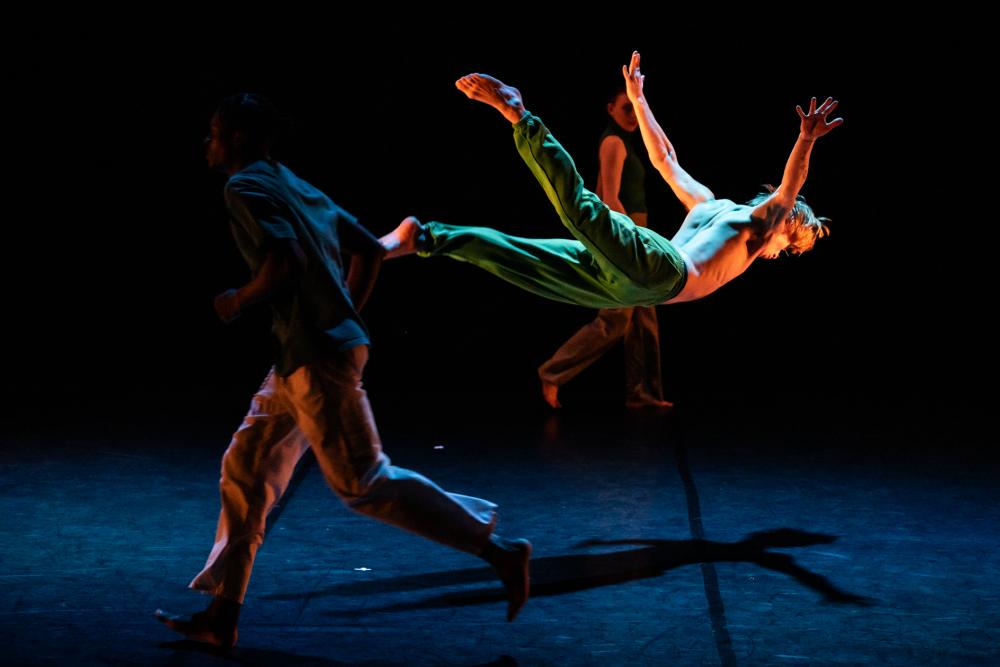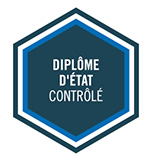Filter list
CloseDance
National Higher Professional Diploma in Dancing (DNSPD)
The Pôle supérieur d’enseignement artistique Paris — Boulogne-Billancourt (PSPBB) is currently the only public institution in France to award the National Higher Professional Diploma in Jazz Dance (Diplôme national supérieur professionnel de danseur jazz).

Our partnership with the Paris 8 Vincennes — Saint-Denis University means that our students can obtain a Bachelor’s degree in Musicology (Licence Musicologie) — dance track at the same time.

The teaching approach
- Train versatile, competent dancers who are adapted to the realities of the professional context
- Provide regular multidisciplinary teaching (jazz, modern, classical and contemporary dance, tap, drama, singing, hip-hop, etc.) as well as workshops, master classes and cross-disciplinary artistic projects
- Give pride of place to learning to perform on stage, a place where artistic sensitivity, technical mastery and the creative process are affirmed
- Include training in a reflection on the evolution of jazz dance and its place in the contemporary artistic landscape
The course, supported by a number of partnerships, combines high-level technical teaching with theoretical teaching, organised between the PSPBB and the university.
Courses
The course on offer leads to:
- The Bachelor’s degree in Musicology – dance track in partnership with Paris 8 Vincennes – Saint-Denis University (RNCP level 6)
- National Higher Professional Diploma in Jazz Dance
By following this course, students will gain student status and will be eligible for CROUS financial support awarded on the basis of social criteria.
See the course outline in the General Study Regulations (RGE)
Post-DNSPD studies are possible at other institutions:
- State Diploma for Dance Teachers (Diplôme d’État de professeur de danse), some credits (UV) of which can be validated by obtaining the DNSPD,
- Master’s degrees (cultural action, art therapy, management and administration, research).
Bachelor’s degree in Musicology — dance track
The university’s Bachelor’s degree in Musicology — dance track is available from the DNSPD 2 level upwards. Students enter directly into the third year of Bachelor, where classes are spread over the 2nd and 3rd years of the course. The technical and theoretical courses taken during the 1st year of the DNSPD will enable the student to pass the 1st and 2nd years of Bachelor.

Présentation du département danse PSPBB
Professional integration
As well as mastering choreographic expression, the course also includes additional training in singing and dramatic art, so as to respond as effectively as possible to the reality of the professional offer (musicals, cabarets, audiovisual productions, etc.).
Internships are organised throughout the three years of the DNSPD course. Students reconstruct repertoire extracts with guest artists and/or using notation. They immerse themselves in creations commissioned from internationally renowned choreographers. They produce their own pieces independently, take part in jam sessions and cross-disciplinary projects with actors, singers and visual artists.
A fundamental step on the road to professionalism, learning to perform enables students to develop their artistic sensibility and technical skills. In front of an audience, they gain autonomy, develop their individuality and nurture their creative process.
The internship in a professional structure is an opportunity to get to know the different players in a dancer’s life within a professional structure. The internship is part of the curriculum for national higher professional diplomas and is included in the decrees relating to these diplomas. All students enrolled in the DNSPD programme at the PSPBB must undertake at least one internship during their DNSPD 2 or DNSPD 3 programme.
Alleyne Dance Company, Andy Da Veiga, Atelier de Paris CDCN, Avshalom Pollak Dance Theater, Ballet Preljocaj-Pavillon Noir, Ballet de Lorraine-Centre Chorégraphique National (direction Petter Jacobson), Centre Chorégraphique National de Créteil (direction Mourad Merzouki), Centre Chorégraphique National de Créteil (direction Mehdi Kerkouche), Centre Chorégraphique National de Caen en Normandie (direction Alban Richard), Centre National de la Danse (Formation et Pédagogique), Chateauvallon-Liberté, scène nationale, CobosMika Company (Peter Mika et Olga Cobos), Compagnie Accord des Nous (Vivien Visentin), Compagnie Blanca Li, Compagnie Cathy Grouet — Youh C D’Jazz, Compagnie Difé Kako (Chantal Loïal), Compagnie Hervé Koubi, Compagnie Komoco (Sofia Nappi), Compagnie La Calebasse (Merlin Nyakam), Compagnie Laboration art company (Laura Arend), Compagnie Lamalo (Jeremy Alberge), Compagnie La Migration (Marion Even, Quentin Claude), Compagnie Liloulight (Julie Sicard), Compagnie Mâle (Johana Maledon), Compagnie Moral Soul (Herwann Asseh), Compagnie Opendor (Adrien Ouaki), Compagnie Pas à Pas — Corps à Corps (Adeline Bernardo), Compagnie Sophie Courtin, Compagnie TU Dance (Toni Pierce-Sands et Uri Sands), Compagnie Yvann Alexandre, CRR Cergy Pontoise (pour la production West side story), DD Dorvillier Human future dance corps, Elephant in the Black Box Company (Madrid), FSCF (Fédération sportive et culturelle de France), Hérissons productions (pour la production Black legends), Kunstenfestivaldesarts (Bruxelles), La Briqueterie CDCN du Val-de-Marne (La) Horde Ballet National de Marseille CCN, Off Jazz Dance Company (Gianin Loringett), RB Dance Company, Roméo Production (pour la production Romeo et Juliette), Stage Entertainment (pour la production Le Bal des vampires), Théâtre de la Ville, Théâtre du Châtelet (pour la production Singin’in the rain), Théâtre Golovine (Avignon), Tous danseurs, la tribune de toutes les danses.